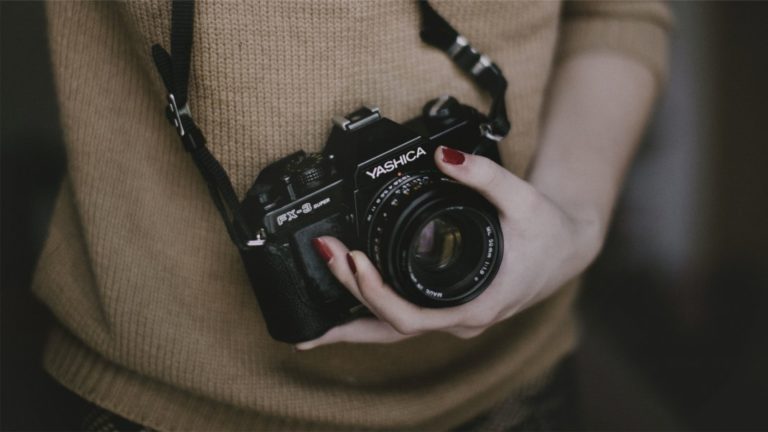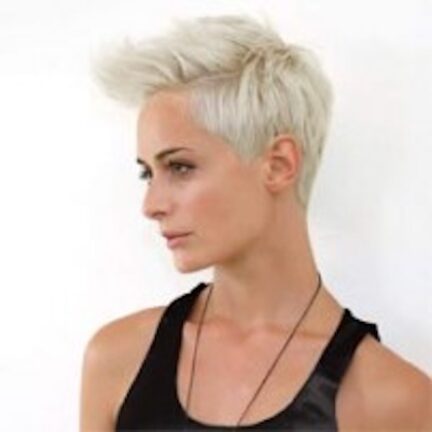What it Means to Know Yourself

I stood in my living room before a full length mirror and – for a good length of time – watched myself eat vegan cheddar popcorn straight out of the bag.
As I stood there contemplating my appearance – and my existence – while munching on handful after handful of starchy goodness, I noticed: Something was different.
Over the course of my 28 years, I have on many occasions curiously observed myself in mirrors and camera displays. I’ve partaken in my fair share of self-timer photo shoots, diligently choosing my Instagram filters for the most flattering polish. I have deleted and re-taken “candid” shot after “candid” shot. In short, my physical appearance and I are well acquainted.
But this time there was something missing. Something that felt very familiar and suddenly very absent. And that something was scrutiny.
I am void of scrutiny
It feels a little odd, though not at all unpleasant. How could it? In that moment I was suddenly at peace with – everything. My weight. The dark circles beneath my eyes. My age. Even the sharpness of my nasal bone, which can look anywhere from dainty to profuse depending on the angle and one’s vantage point. And as I stood and munched and munched and stood – I knew full well why I so suddenly accepted myself without resistance.
You see, in the last year, I met myself. I ventured into an exercise of self recognition. I began dissecting and dissolving many of the things I knew made me be ME, and I did it by constantly asking:
“What does my emotional reaction (to XYZ) say about me?” and “Why am I having this reaction?”
The ‘I’ we tend to identify with is simply the accumulation of all the experiences we’ve ever had, which in turn have each triggered a different set of emotional responses – thus making us who we (think) we are by systematically labeling, defining, compartmentalizing, and ultimately separating ourselves from the outside world. But the truth is all of those unavoidable events in our history – while they all had divine purpose and were in fact crucial for our personal growth in the moment we experienced them – are not truly US. They are experiences – meant to be experienced and then let go of completely. But because truly experiencing anything new requires a willingness to face the dreaded unknown, we instead often recoil, following the impulse to instead protect ourselves from that which may hurt us. And because of this automatic defense mechanism, remnants of the unfinished experience cling on somewhere deep inside our subconscious; it can wreak havoc on our daily lives, our self image, our ability to experience love, joy, fear, pain – everything.
Life Sucks and then you die. Or not?
If you find yourself anxious, unhappy, or fearful, don’t assume that’s just the way things are and surrender to it. You are the author of your thoughts – which in turn are the authors of your emotions. If you truly want to know yourself and understand why you are the way you are, you must dig through every experience and find the original. The one that triggered them all.
Let me give you a personal example using a classic: shame.
I recently completed a creative project that I did not feel properly represented my artistic abilities and therefore caused me to be ‘ashamed’ of the end result. Any time I showed it to anyone, I felt a strong surge of anxiety which was inevitably followed by me rattling off a list of excuses as to why it had turned out sub par. I knew I had to make peace with it if I wanted to gain anything from the experience. So I decided to get to the bottom of it.
The morning of a film festival where this particular project was going to be shown, I meditated with the intention of finding out where my searing shame originated from. And sure enough – I was led to a very distinct childhood memory. Because I have turned meditation into a habit (meaning I no longer question whether to do it or not, I just do it), I was able to locate the trigger.
Pink Pony Says Thank You
When I was 10 years old I felt isolated and unwanted in a new school. One day, (probably because the parents insisted), I was invited to a classmate’s slumber party. The day afterward I was so overwhelmed with gratitude for having been included that I handmade a card on which I wrote Pink Pony Says Thank You. It depicted, of course, a crudely drawn pink pony. Not long after presenting the 10-year-old host with my token of appreciation, the card was passed around the 5th grade classroom and ruthlessly mocked. Humiliated, I learned three lessons that day which I have carried with me and honored ever since:
- Just because you made it and just because you like it doesn’t mean anyone else will (cause for massive self-trust issues).
- Never show anyone anything you’ve created unless you’re willing to be ridiculed (cause for pessimistic outlook on future outcomes as a means to protect oneself from disappointment).
- It’s better not to care (cause for stifled experience/expression of appreciation).
Now, you can see how these deep-rooted belief systems could prove problematic, if not detrimental, when you are – like I am – pursuing a career in the arts.
And this is just one tiny, single example of thousands of instances in which a painful past experience got “stuck” in me – and you, and everyone – and is powerfully affecting the way we live our lives.
Reprogram Your Mind
The beauty of it all is that the recognition of this fact is the first step to changing the game. You don’t have to be a slave to your past. You can actively search and destroy those memories and essentially re-program yourself with new beliefs that will serve you better.
When I realized that this one experience was at the root of my shame issues surrounding my work, it was easy to see that forgiving myself was all I had to do to release it. The 10-year-old version of me that still unknowingly hated herself for having been so dumb to make a card that says Pink Pony Says Thank You could now understand – from the 28-year-old’s perspective – that I had done nothing wrong. In fact, my gesture was one fueled by love, kindness, and gratitude. Once I could clearly see that, I was able to forgive myself and be done with it. Tears streamed down my cheeks as I felt a tremendous weight lift off my shoulders – a weight I had carried around with me for so many years without ever questioning its validity.
And we all do that. We all carry the weight of our past experiences with us – completely unaware that the negative feelings of trapped emotion we feel are optional. We can choose to release them and be free once and for all. It’s what therapy accomplishes, only you don’t need a therapist to do it. All you need is:
- A willingness to do the work and find your triggers.
- The courage to want to know.
- The ability to see the past event objectively and let it go.
That is why I could stand and stare at my reflection and – for the first time – feel nothing but peace. Because for the last year, I have immersed myself in the challenge of getting to know myself. With the help of books like The Untethered Soul by Michael A. Singer and Ask and it is Given by Abraham Hicks, I was able to start recognizing the true nature of my Self and begin to make peace with it.
It has been a long journey, and it is far from over. But already life has become richer and sweeter than I ever imaged. So I invite you to join me – because inner peace is a reality for all of us.
We simply have to choose it.
Couples Meditation For A More Intimate Bond With Your Partner

Couples meditation or partners meditation is a fantastic way to get closer to your significant other on a more intimate level. Similar to couples therapy, it can work to fine tune the communication between two partners.
We already know meditation has positive impacts on our individual stress levels, attention span, our ability to feel compassion, mental health, mindfulness, and our physical bodies. But by practicing mindful meditation on a regular basis with your significant other, you’ll also be able to reap those benefits in regards to your relationship. This practice is popular as a conflict-resolution method and for identifying toxic factors in your relationship. It allows couples to explore new ways to solve problems, create communication guidelines, and make reasonable compromises.
However, it doesn’t necessarily need to be practiced only during tough times. Meditation works to forge new paths of communication to establish a team allegiance, or strengthen the one you’ve already established. By adding it to your routine, you will be reminded of the bigger picture, feel more level-headed, and form a more spiritual connection with your partner.







